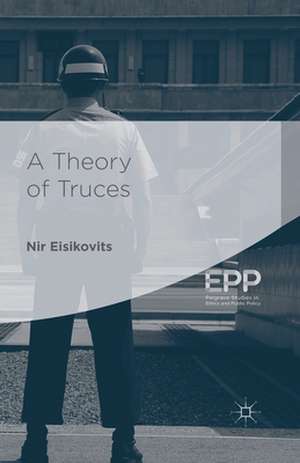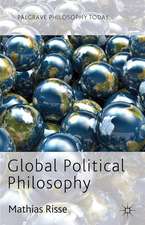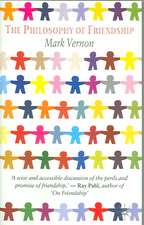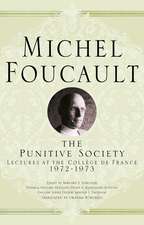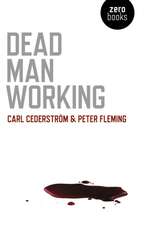A Theory of Truces: Palgrave Studies in Ethics and Public Policy
Autor Nir Eisikovitsen Limba Engleză Paperback – 14 ian 2014
| Toate formatele și edițiile | Preț | Express |
|---|---|---|
| Paperback (1) | 378.12 lei 43-57 zile | |
| Palgrave Macmillan UK – 14 ian 2014 | 378.12 lei 43-57 zile | |
| Hardback (1) | 383.33 lei 43-57 zile | |
| Palgrave Macmillan UK – 4 noi 2015 | 383.33 lei 43-57 zile |
Preț: 378.12 lei
Nou
Puncte Express: 567
Preț estimativ în valută:
72.38€ • 78.64$ • 60.84£
72.38€ • 78.64$ • 60.84£
Carte tipărită la comandă
Livrare economică 21 aprilie-05 mai
Preluare comenzi: 021 569.72.76
Specificații
ISBN-13: 9781349552733
ISBN-10: 1349552739
Pagini: 122
Ilustrații: X, 122 p.
Dimensiuni: 140 x 216 mm
Greutate: 0.18 kg
Ediția:1st ed. 2015
Editura: Palgrave Macmillan UK
Colecția Palgrave Macmillan
Seria Palgrave Studies in Ethics and Public Policy
Locul publicării:London, United Kingdom
ISBN-10: 1349552739
Pagini: 122
Ilustrații: X, 122 p.
Dimensiuni: 140 x 216 mm
Greutate: 0.18 kg
Ediția:1st ed. 2015
Editura: Palgrave Macmillan UK
Colecția Palgrave Macmillan
Seria Palgrave Studies in Ethics and Public Policy
Locul publicării:London, United Kingdom
Recenzii
'In A Theory of Truces, Nir Eisikovits aims to revive interest in the often ignored and disparaged idea of a truce. Against the assumption that war and peace are the only options, he shows why truces are often better than continued warfare or seeking peace under impossible circumstances. Through careful analysis, interesting discussions of a variety of thinkers, and insightful case studies, Professor Eisikovits shows how truces can save lives and diminish hostilities when peace is unattainable'. - Stephen Nathanson, Emeritus Professor of Philosophy at Northeastern University, USA, and author of Terrorism and the Ethics of War.
'In this original and highly interesting book, Nir Eisikovits breaks free from the traditional dichotomy of war and peace and suggests a different theoretical model for resolving conflicts, obtaining stability and reducing casualties. In the midst of the debate about the Iranian accord and the deadlock in the peace process in the Middle East, the author presents a new philosophical and moral dictionary, which may help not only in theory but in practice, not only in truce thinking but also in truce making, namely in managing conflicts, buying time and mainly: avoiding wars and armed conflicts'. - Professor Gabriela Shalev, Ono Academic College, Hebrew University of Jerusalem, Israel, and former Israeli Ambassador to the United Nations
'In this splendid exercise in nonideal theory, Eisikovits looks at what to do in the real world when perfect ideals of peace and reconciliation may hang out of reach. Skillfully steering around the shoals of realpolitik and defeatism about peace, he shows us how 'truce thinking' can be morally principled as well as valuable in practice. This seemingly modest approach to containing violence can profoundly transform our thinking about what counts as peace. It makes clear why we value freedom from violence too much to sacrifice it and our fellow human beings on the altar of perfect or perpetual peace. This book fills a blank between pacifism and just war thinking with a sane, humane, and morally persuasive case for containing violence when we can for as long as we can in our very imperfect circumstances.' - Margaret Urban Walker, Donald J. Schuenke Chair in Philosophy, Marquette University, USA
'In this book Nir Eisikovits shows that he is indeed a master of the reasonable, committed to hastening the day when the wolf shall dwell with the lamb. Reconciliation was the subject of his previous book. Here he celebrates the truce as the tentative, imperfect first step towards the peace in which reconciliation can take place. A text for the hopeful.' - Charles Fried, Beneficial Professor of Law, Harvard Law School
'In this original and highly interesting book, Nir Eisikovits breaks free from the traditional dichotomy of war and peace and suggests a different theoretical model for resolving conflicts, obtaining stability and reducing casualties. In the midst of the debate about the Iranian accord and the deadlock in the peace process in the Middle East, the author presents a new philosophical and moral dictionary, which may help not only in theory but in practice, not only in truce thinking but also in truce making, namely in managing conflicts, buying time and mainly: avoiding wars and armed conflicts'. - Professor Gabriela Shalev, Ono Academic College, Hebrew University of Jerusalem, Israel, and former Israeli Ambassador to the United Nations
'In this splendid exercise in nonideal theory, Eisikovits looks at what to do in the real world when perfect ideals of peace and reconciliation may hang out of reach. Skillfully steering around the shoals of realpolitik and defeatism about peace, he shows us how 'truce thinking' can be morally principled as well as valuable in practice. This seemingly modest approach to containing violence can profoundly transform our thinking about what counts as peace. It makes clear why we value freedom from violence too much to sacrifice it and our fellow human beings on the altar of perfect or perpetual peace. This book fills a blank between pacifism and just war thinking with a sane, humane, and morally persuasive case for containing violence when we can for as long as we can in our very imperfect circumstances.' - Margaret Urban Walker, Donald J. Schuenke Chair in Philosophy, Marquette University, USA
'In this book Nir Eisikovits shows that he is indeed a master of the reasonable, committed to hastening the day when the wolf shall dwell with the lamb. Reconciliation was the subject of his previous book. Here he celebrates the truce as the tentative, imperfect first step towards the peace in which reconciliation can take place. A text for the hopeful.' - Charles Fried, Beneficial Professor of Law, Harvard Law School
Notă biografică
Nir Eisikovits is Associate Professor of Legal and Political Philosophy at Suffolk University in Boston, US, where he directs the program in Ethics and Public Policy. He writes and teaches about transitional justice and the ethics of war.
